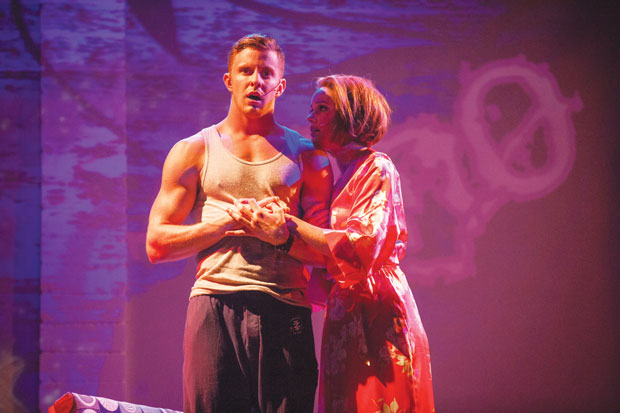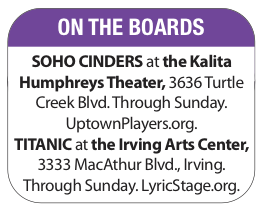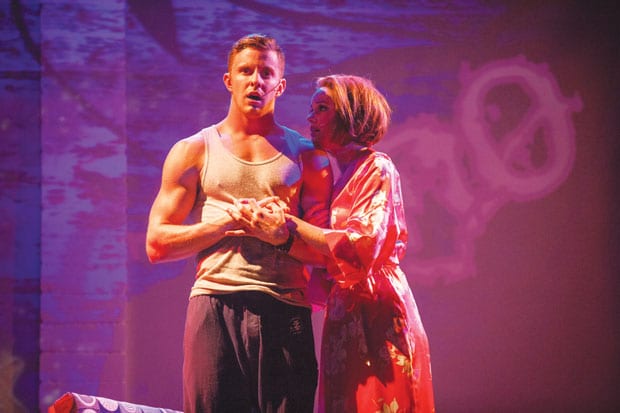Gays in politics mark ‘Soho;’ ‘Titanic’ steers toward the iceberg

HUNKY CANDIDATE | Sean Burroughs plays a closeted politician and Janelle Lutz is his long-suffering fiancee in the perky musical ‘Soho Cinders.’ (Photo courtesy Mike Morgan)
ARNOLD WAYNE JONES | Executive Editor
 The problem with old-fashioned fairy tales? Not enough fairies. At least, not the modern kind.
The problem with old-fashioned fairy tales? Not enough fairies. At least, not the modern kind.
That’s not the problem with Soho Cinders, a present-day updating of the Cinderella story. There are no magical fairies here, not the kind who wave a wand and turn pumpkins into carriages. Instead, it’s just a story of two gay guys — out-and-not-so-proud Robbie (Peter DiCesare), a college student, launderette owner and sometime rent boy; and James Prince (Sean Burroughs), a dour, closeted politician who’s Robbie’s secret paramour — who try to make a relationship work in the absence of honest communication.
It’s quite a chore. James has no idea he’s in love with a professional escort (and not even a high-class one — he lives on Old Compton Street, which looks like the London equivalent of Skid Row). Robbie knows James has a fiancée, but seems to have convinced himself it doesn’t matter. Meanwhile, Lord Bellingham (Francis Henry), a sleazy powerbroker, wants Robbie to himself, while Robbie’s hideous step-sisters, Dana (Kim Borge) and Clodagh (Stephanie Felton) are trying to steal his business away from him.
Things aren’t any better on James’ homefront. He’s a vague kind of politician, the kind who talks about honesty while lying about who he is.
He allows a sinister campaign manager (Ian Mead Moore) to plot underhanded goings-on behind his back while pointedly not sleeping with his girlfriend Marilyn (Janelle Lutz).
Soho Cinders is best when it’s sticking to the romance and comedy of the piece, and steering clear of the politics and back-story. Eliot Davis’ book is rife with two-dimensional clichés and cut-out characters. Even the very existence of a relationship between Robbie and James seems odd — they met online? Like Grindr? And James plans to be mayor? Well, stranger things have happened.
But musicals like this aren’t meant to be take too seriously. It’s a lark, ripe with engaging songs.
It starts off well with the ensemble “Old Compton Street,” which explains the working-class roots of the neighborhood while introducing us to most of the main characters. (It recalls “Skid Row” from Little Shop of Horrors or “We Live on Avenue Q” from Avenue Q.) There are some more delights in the bubbly score, including the love duet “Gypsies of the Ether” and the torch song “Let Him Go,” which showcases not only Lutz’ beauty but her deft interpretation of an emotional number.
The truly memorable numbers, though, come courtesy of Borge and Felton — the most over-the-top clowns in this Piccadilly circus. Clad in trashy, ill-fitting clothes and exaggerated makeup and hair (Dana is inexplicably but undeniably pregnant), they are the outrageous comic relief. In two songs especially — the Act 1 adrenaline shot of “I’m So Over Men” (destined to be a drag queen staple) and the closer “Fifteen Minutes,” they mine comedy gold out of every note. They are almost able to make up for the lead-footed dancing and extraneous numbers led by James’ campaign manager — “Spin” and “The Tail That Wags the Dog” are black holes of dramatic momentum.
Soho Cinders is a light show, and would improve with some streamlined entrances and a thorough rewrite of the script. It may not take you to the ball, but anytime the boy runs away with the other boy, something’s going right.
The last time Lyric Stage presented Titanic, it was on the Irving Arts Center’s smallish Dupree Theater, an intimate near-concert version of Maury Yeston’s musical about the doomed transatlantic crossing of the largest moveable object mankind had yet created. With nearly 40 singing parts, it was a showcase of musicality.
So what happened on its transfer to the cavernous Carpenter Theater? It’s lost its intimacy, its charm. The Titanic was a huge ship, and conveying such size requires either immense set design or a conspiratorial sense that the music serves as a stand-in for the real thing. That’s a bargain easy to make in 200 seats, and less persuasive when you’re 60 feet from the stage.
Yeston doesn’t show as much variety and inventiveness on this score as he did on the musical Nine, one of the best shows of the 1980s. His Titanic songs lack much personality, and Peter Stone’s book (not based on James Cameron’s film — it came out months before the movie — but including many of the historic characters among its cast) tries to accomplish too much with too little detail. We gets hints of the differentiation of the classes on the ship, and how the poor were fish food by the time the ocean liner sank, but the storytelling is jumpy. (It also doesn’t make sense that the director mimes such actions as sipping champagne when a simple flute would create more verisimilitude.)
The cast, bless their hearts, sing their lungs out, but this time, bigger doesn’t mean better. This Titanic sinks fast.
This article appeared in the Dallas Voice print edition June 20, 2014.

